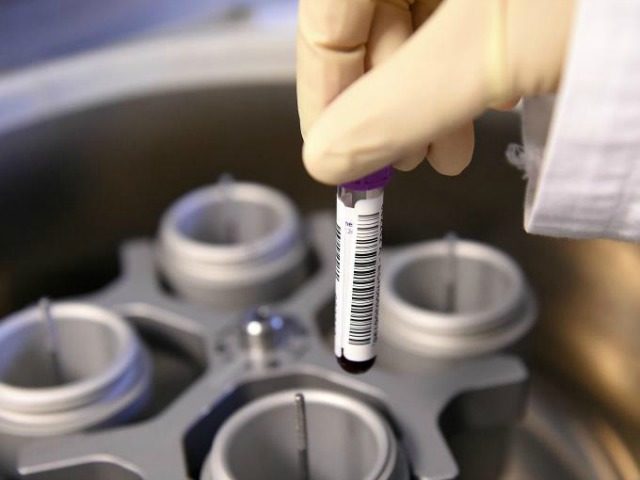On Thursday, medical testing company Theranos announced the departure of its president and chief operations officer, Sunny Balwani, even as a swarm of federal and state regulatory agencies descend upon the company.
The Wall Street Journal describes Balwani’s departure as part of “a broader board reorganization announced by the Palo Alto, California firm.” The board will reportedly be expanded to include three more members to “beef up its scientific and medical expertise.”
Vanity Fair reports one of the new board members as Fabrizio Bonanni, a former biotech executive who “brings some much-needed expertise in health care.” The other two are former Centers for Disease Control director William Foege and former Wells Fargo CEO Richard Kovacevich, as reported by CNN.
The board has previously leaned toward star power, including what Vanity Fair calls “political dignitaries like former secretaries of state George Schultz and Henry Kissinger.”
Balwani was personally in charge of much Theranos research, even though he had no medical or science background, according to former employees cited by the Wall Street Journal.
The current deficiency of expertise lies at the heart of Theranos’ problems, because its products just don’t do what the company claimed they would do.
Vanity Fair refers to Theranos as a “$9 billion tech unicorn,” viewed by investors as “a miraculous company with a too-good-to-be-true product and a wunderkind Stanford dropout C.E.O. in the mold of a young Steve Jobs (right down to the black turtlenecks).”
That would be Elizabeth Holmes, who was just 19 years old when she founded the company. Her miracle technology was a new system of blood testing that could perform a full panel of lab tests on just a few drops of blood, extracted from the tip of a patient’s finger.
In realty, as the WSJ reported last October, Theranos performed “the vast majority of more than 200 tests it offered to consumers on traditional lab machines purchased from other companies.” Company employees doubted the accuracy of the few tests performed with genuinely new technology.
The Wall Street Journal’s reporting prompted “wider scrutiny” that put Holmes “on the hot seat,” as CNN puts it.
“Multiple federal and state regulators, including the Securities and Exchange Commission and the U.S. Attorney’s Office in San Francisco, are investigating the company’s practices,” CNN observes, adding that the Centers for Medicare and Medicaid Service has proposed banning Holmes and Balwani from the laboratory business for two years.
Theranos called that a “worst-case scenario,” an assessment few would dispute.
One of the allegations made by former employees to the Wall Street Journal is that Balwani ordered them to “only report to the accrediting organizations results from proficiency tests performed on conventional devices, and not the results of those tests obtained from the company’s proprietary Edison machines.”
Balwani was also accused of ignoring concerns about quality control for these Edison machines, accusing one perturbed employee of lacking the expertise to properly evaluate Theranos’ revolutionary processes. CMS, however, found that 29 percent of quality control checks failed during a single month of evaluation.
Vanity Fair finds Theranos besieged by regulators, including the Securities and Exchange Commission and the U.S. Attorney’s Office for the northeastern district of California, for misleading its investors.
The L.A. Times adds that the Justice Department is involved, but there was a little good news for Theranos last month, as the company announced that “investigations by the U.S. Food and Drug Administration and the state departments of health in Pennsylvania and Arizona had been ‘successfully closed out.'”
The company maintains that Balwani’s retirement was not a direct result of these investigations. The board of directors thanked him for for his “invaluable contributions to Theranos’ technology and business,” and said they would “miss him as a board member,” extending gratitude for his “extraordinary service.”
The San Francisco Chronicle firmly took Theranos’ side against federal regulators, arguing “the people most guilty of grandstanding may be the feds themselves.”
While conceding that Theranos is “no doubt a hot mess,” the Chronicle contends that “hyperbolic pitching of a new technology’s potential is not necessarily a crime.”
Noting that an SEC investigation of securities fraud at a privately-held startup is extremely rare, and charges of misleading laboratory regulators are even more uncommon, the Chronicle suggests Theranos is mostly guilty of bungling its relationships with the regulatory state, and making some bad management decisions that should not be criminalized
Also, Theranos may find itself on the wrong end of the Obama Administration’s hunt for high-profile CEOs to punish – motivated by both a desire for glowing press coverage, and lingering guilt over the regulatory disaster of the housing crisis.
“A criminal probe seems like overkill. If anything, Theranos is guilty of exaggeration and cutting regulatory corners. So let agencies like the Centers for Medicare & Medicaid Services, the Food and Drug Administration and the Federal Trade Commission deal with the company,” the Chronicle advises.

COMMENTS
Please let us know if you're having issues with commenting.